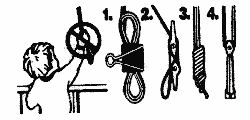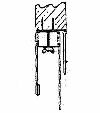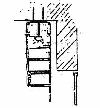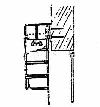Woven Wood Shades Installation Guide
How To Install Woven Wood Shades
Your is made to your custom specifications and is one of the finest window treatments available. Before you unwrap your blinds, please take a few moments to read these instructions. With careful installation and periodic cleaning your shade will provide you with many years of trouble free service.
Your shade includes the following:
- Two installation brackets
- Mounting screws
- Auxiliary support brackets (if your blind requires them)
To install your shade you will need the following tools:
- Pencil
- Screwdriver with medium size blade
- Drill
- 7/64" drill bit (or a hammer and finishing nail)
- 1/16" drill bit
- Scissors
- Level (optional)
SUGGESTED FASTERNER GUIDE
ANCHORS (not supplied)
Plastic or lead anchor insert.
Plastic anchor insert for lightweight blinds only, in drywall, paneling, etc.
HOLLOW WALL ANCHORS (not supplied)
Hollow wall anchor. For heavy blinds.
Hollow wall toggle bolt. For heavy blinds.
 WARNING: To avoid possible strangulation, keep cords out of the reach of children. Use these devices:
WARNING: To avoid possible strangulation, keep cords out of the reach of children. Use these devices:
- Clamp or clothes pin
- Cleat
- Tie the cord to itself
- Tie-down device
Installation & Operating Instructions
Woven Shade Operation & Adjustment
Yarn and wood used on these fabrics have been specially selected. The wood slats retain the grain texture and irregularities inherent in natural wood of this type. The selection of pattern and yarns combines this natural wood with the most contemporary colors for a truly unique window fabric.
Shade Operation
Both Roman & Roll Up shades have the same basic hardware and operating procedure. Cords, whether installed on the left or right side have the same locking mechanism. (See illustration A). To raise the shade merely pull on the cord and release the cord when the shade is at the desired height. To lower the shade, pull the cord to the center of the shade with a slight tug. Then keeping tension on the cord at that angle slowly let the cord go up, thus lowering the shade. If the shade should bind, check the cord alignment over the pulley (under valance).
Shade Adjustment & Alignment
Your shade has been carefully inspected and adjusted by the factory, but minor adjustments may be necessary once it has been installed. The yarns in your woven shade are flexible enough to permit minor adjustment horizontally and vertically for proper alignment on your window. If the bottom of your shade becomes uneven, merely pull down on either side to stretch the yard and align the shade.
If your shade doesn't lie flat against the wall or window, roll the shade tightly from the bottom and twist roll (illustration B) clockwise on one side, counter clockwise on the other, and this will align yarns and slats. Should a strand of yard slip off the edge of the shade, remove the strand from top to bottom - this will in no way affect the strength of the shade.
Shade Maintenance
Clean by vacuuming.
Your woven wood shade is custom made using the finest materials available. Each shade includes all necessary installation hardware and has been checked for operation and alignment. The following instructions are for the three most common installation types.
 Inside Hang (ceiling mounted) - Shade is measured and assembled to fit inside window casement with mounting bracket that is installed to top of casing with screws placed at opposite corners. The wing nuts are removed. The screws slide through the slots on the headrail and are secured by a wing nut. Inside Hang (ceiling mounted) - Shade is measured and assembled to fit inside window casement with mounting bracket that is installed to top of casing with screws placed at opposite corners. The wing nuts are removed. The screws slide through the slots on the headrail and are secured by a wing nut. |
 Outside Hang (ceiling mounted) - Shade is measured and assembled to overlap the window casing. The mounting brackets are then installed to the ceiling by means of screws or toggle bolts placed at opposite corners. Remove wing nuts. The screws slide through the headrail slots and are secured with wing nuts. Outside Hang (ceiling mounted) - Shade is measured and assembled to overlap the window casing. The mounting brackets are then installed to the ceiling by means of screws or toggle bolts placed at opposite corners. Remove wing nuts. The screws slide through the headrail slots and are secured with wing nuts. |
 Outside Hang (wall mounted) - Shade is measured and assembled to overlap the window casing. The mounting brackets are then installed to the wall by means of screws or toggle bolts placed at opposite corners. Remove wing nuts. The screws slide through the headrail slots and are secured with wing nuts. Outside Hang (wall mounted) - Shade is measured and assembled to overlap the window casing. The mounting brackets are then installed to the wall by means of screws or toggle bolts placed at opposite corners. Remove wing nuts. The screws slide through the headrail slots and are secured with wing nuts. |
